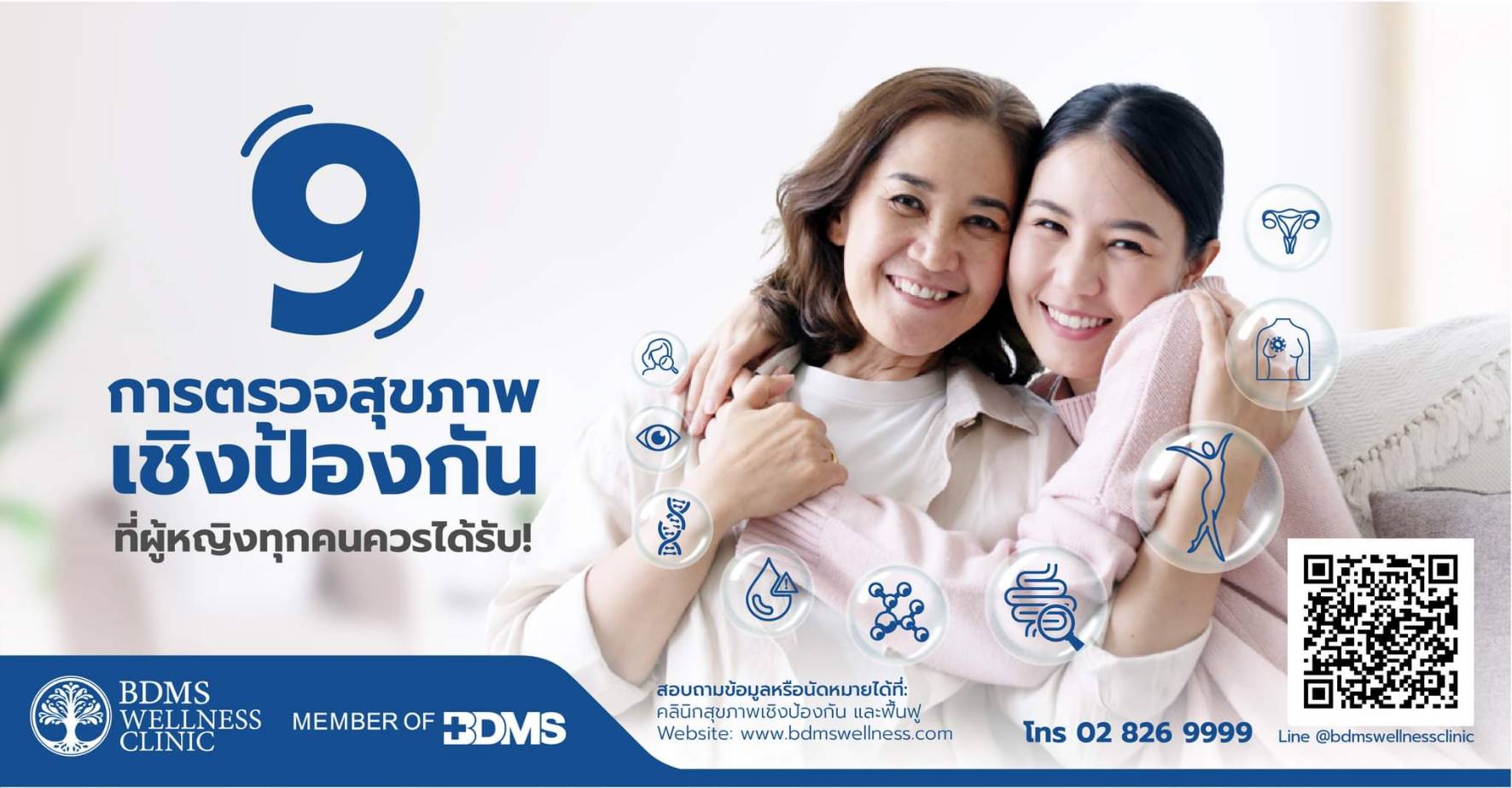
9 preventive health checks that every woman should receive

On a special month, BDMS Wellness Clinic would like to invite mothers and all women to come and check their health. Because maintaining our health (Wellness) and living a long life with happiness (Happiness) is better than the exhaustion and suffering that may come with illness (Sickness). Preventive Check-up It opens up the opportunity to screen for diseases and abnormalities at an early stage. To prevent and avoid complications and serious health problems that may occur in the future.
9 Preventive health checks that women should receive are as follows
1. Pap smear or pap test
It is a screening test for cervical cancer. to detect abnormal cells or cells that may develop into cancer cells Including testing for the human papillomavirus (HPV), which can increase the risk of cervical cancer. The American Cancer Society recommends that women age 25 and older have a smear every three years.
2. Mammogram
Starting at age 50, women should have a mammogram every 2 years, but if you’re at risk for breast cancer should be examined as soon as possible and should be followed up annually for example If your mother was diagnosed with breast cancer at age 45, you should have a mammogram at 35 or 10 years in advance. efficient Studies show that mammogram Can reduce deaths from breast cancer by up to 1 in 3 of all women.
3. Body Composition Analysis
The body is always changing composition. Body measurements to analyze bone density, fat mass, and muscle mass with DEXA scans provide more body information than body weight alone. All women should have a bone density screening at age 65 to reduce the risk of osteoporosis. (osteoporosis) and know body fat mass that we are obese or not To prevent more than 32%, reduce the risk of chronic non-communicable diseases (NCDs), including to maintain muscle mass in an appropriate range. Prevent potential falls.
4. Screening for colon cancer
Study shows that screening for colon cancer Helps find abnormal tissue and cancer cells at an early stage Reduce the chance of spreading the disease. provide better treatment results and may reduce the death rate People over the age of 45 or have a family history of colon cancer should always be screened.
Colon cancer screening includes Carcinoembryonic antigen (CEA) test, which is a cancer marker (Tumor marker), Fecal occult blood test, which should be done annually. once per time, and colonoscopy and colonoscopy every 3 to 5 years. There are many forms of screening depending on the type of cancer. Every woman is advised to consult with a medical professional for advice.
5. Examination of various hormone levels
Because hormones affect work throughout the body. Test of sex hormone levels in the blood It can indicate many important women’s health information, such as menstrual cycle, fertility, menopause, polycystic ovary syndrome; PCOS) or certain tumors
Testing other hormone levels such as insulin, thyroid hormones, or growth hormones can help diagnose the risk of various diseases such as diabetes, obesity, or problems with obesity. thyroid Measurement of hormone levels leads to recovery. by modifying lifestyle Including the supplementation of various drugs and vitamins.
6. Blood sugar and lipid monitoring
Type 2 diabetes is caused by insulin resistance. We should screen for fasting blood sugar levels. And the accumulation of sugar (Glycated hemoglobin A1C; HbA1C) together with the hormone insulin level in the blood (Fasting Insulin) regularly. Even though there have never been any signs of diabetes before. Especially women who have a history of gestational diabetes. Diabetes should be screened every 3 years after pregnancy.
Total cholesterol, triglyceride and blood lipid measurements (Triglyceride), LDL fat (LDL), and HDL fat (HDL), making known health risks. Prolonged high levels of sugar and fat lead to other health problems and the incidence of cardiovascular disease (Cardiovascular disease), both heart disease and stroke (Stroke), which is the leading cause of paralysis, paralysis and number one death in Thailand. Blood sugar and lipid monitoring Helps you to be careful with your lifestyle. Both about eating and exercise Including the doctor may prescribe specific drugs. to prevent future disease
7. Genetic testing for cancer risk
BRCA1 (BReast CAncer gene 1) and BRCA2 (BReast CAncer gene 2) are genes responsible for protein production. Help repair damage to DNA, mutations in both genes. Increase the risk of many types of cancer. especially breast cancer and ovarian cancer
BRCA1 gene mutation increases the chance of breast cancer by 55% – 72% and ovarian cancer increases up to 44%. BRCA2 gene mutation increases the chance of breast cancer. and ovarian cancer after the age range of 70 – 80 years has increased by 69% and 17%, respectively
The only way to know for sure if you have a BRCA mutation is to have your genetic code tested. This method is extremely important for every woman. Especially if there is a family history of cancer.
8. Eye and hearing examination
Because we only have one pair of eyes and ears in life. Regular eye and ear health checks are very important. Preliminary eye health checkup to check for problems that may occur with the eyes, such as diabetic retinopathy Or the result of high blood pressure, glaucoma, such as glaucoma, cataract, pinguecula, pterygium, etc. All adults should have an eye exam every 2 years until the age of 60. Alternatively, you may be examined earlier if you feel that your eyesight has changed. hearing level check It examines the functioning of the ear and the auditory system to determine the level of hearing. Help watch out for hearing loss. It should be examined every 10 years and annually after the age of 60 years or older.
9. Skin health check
Skin Analysis with a Complexion analysis imaging system is to identify the type of skin that is unique to each individual. Makes known the real cause of skin problems, advantages and disadvantages with a high resolution camera. This makes it possible to analyze the upper and deeper layers of skin. You can see the amount of black spots, red spots, blemishes, freckles, inflammation of the skin. The width of the pores, wrinkles, substances that cause acne on the face, UV Spots, uneven skin tone. and can also tell the real skin age of each individual So that the doctor can give advice and treatment that is on point. Including choosing products that are most suitable for your skin as well as women.
Reference
- Recommendations for Well-Woman Care Clinical Summary Tables [Internet]. Washington, DC: Women’s Preventive Services Initiative (WPSI); 2022 [cited 6 July 2022]. Available from: https://www.womenspreventivehealth.org/wp-content/uploads/FINAL_WPSI_ClinicalSummaryTables_2022.pdf
- Cleveland Clinic medical professional. Hormones: What They Are, Function & Types [Internet]. Cleveland Clinic. 2022 [cited 30 June 2022]. Available from: https://my.clevelandclinic.org/health/articles/22464-hormones
- Colorectal Cancer Screening (PDQ®)–Patient Version [Internet]. National Cancer Institute. 2022 [cited 6 July 2022]. Available from: https://www.cancer.gov/types/colorectal/patient/colorectal-screening-pdq



Leave a Reply
You must be logged in to post a comment.